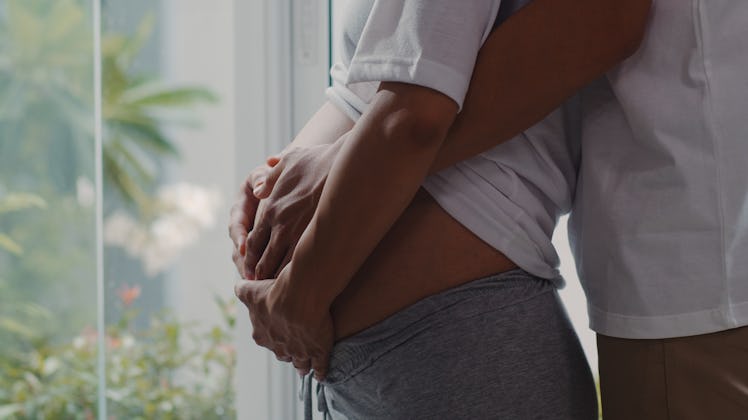Baby Kicking 101: When, Why, And How Babies Kick In The Womb
Physicians recommend you start tracking your baby’s kicks at the beginning of the third trimester.

A baby kicking in the womb is a major milestone. It’s the first emotional bond a pregnant person has with their baby, and the first encounter their partner has with their soon-to-be kid. In essence, a baby’s movement in the belly are the first fateful meetings between parent and child. And from growing bones to tiny hiccups, there are scientific reasons why babies stay active during development, moving, kicking, and fluttering in the womb. So when can you feel the baby kick? This is when babies start kicking in the womb, why they kick, and what baby kicking means. Plus some tips on how to instigate more baby kicking. Bring it on, kid.
When Can You Feel a Baby Kick?
Babies start moving at 12 weeks, but a pregnant person is unlikely to feel anything besides “flutters” until 16 to 20 weeks. That’s when you’ll feel your first baby kick. Baby kicks should strengthen, with a complement of twitches (those are baby hiccups!) through the third trimester. Kicks then slow down slightly around week 36 when the womb becomes too crowded for vigorous thrashing. Babies are most active in the morning and in the evening, and their kicks are easiest to detect when the pregnant person is sitting or lying down.
Starting at the beginning of the third trimester, physicians generally recommend that parents begin monitoring baby’s movements. If at any point a parent suspects the baby is moving less than usual (even after 36 weeks), they should call their doctor immediately. Babies don’t move all the time. But, as a rule of thumb, shoot for 10 movements per hour in the third trimester. And keep a careful eye on whatever is normal for your baby. If a child is always kicking in the morning, even one morning without fetal movement is cause for concern.
Why Babies Kick in the Womb
Even though kicks can be uncomfortable, every sharp kick helps shape your baby’s growing bones. A recent study in the Journal of the Royal Society Interface found that the force of fetal kicks markedly increases between 20 and 30 weeks gestation, then declines by 35 weeks. This suggests that a baby’s kicks are the most vigorous during those middle stages of fetal development, just when bones and joints are beginning to take shape. It makes sense that as they begin to rapidly develop, they start testing out movements from inside the womb. Animal studies have shown that stationary fetuses emerge with bone and joint problems.
Fetal movement may also be linked to long-term behavior. One fascinating but less authoritative study found that “fetal motor activity appears to predict temperament attributes related to regulatory behaviors in early childhood.” So it’s possible that a baby’s kicking also has something to do with neurological development. However, causation is entirely unclear, so it’s also possible that babies with poor neurological development move less in utero.
Regardless, these studies broadly suggest that when your baby is kicking, it’s probably not just a friendly salutation from the inside — it’s an important part of fetal development. Parents who get kicked a little too hard can rest assured that it’s a productive part of the process.
How to Make Your Baby Move and Kick
There are a handful of age-old tricks ultrasound techs use to get sleepy babies kicking in utero. Drinking juice or another sugary beverage is a time-honored way to give your kid a minor sugar rush and get them moving. Raising your adrenaline by watching a scary movie can also get your baby kicking. In the third trimester, when the baby’s eyes and ears are more or less done developing, shining a light on the pregnant person’s belly or playing music may help a baby perk up and kick.
One study found that babies move when parents are lying on their sides and freeze up when the parent lies on their back. The reason is slightly horrifying — pregnant people decrease their fetuses’ oxygen supply when they lie on their backs in late pregnancy, so their babies stop moving to conserve oxygen. The joy (not to mention reassurance) of regular baby kicks is just one more reason for pregnant people to sleep on their sides.
This article was originally published on